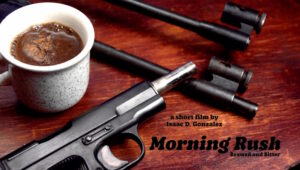Took a personal day yesterday, both for a quiet day off without the kids and to get our taxes done. Solid federal refund but we owe state tax for the first time. Grrrr…
The whole tax system is designed to favor people who own property and investments—not to mention married heterosexuals—and screw those that can’t afford either. This property thing has always been a sticky issue as I’m leery of it and Salomé really wants it.
Weird but relevant segue: we went to see Barbershop 2 later in the afternoon and it totally f’d up my perspective on life, particularly on this question of owning property.
I loved the movie. In some ways, much more than the first one. There’s only been a handful of “black” movies that have struck me as having that certain something at their core that expressed a sincere love for the people it presented, warts and all, and this is one of them. The first Barbershop, Waiting to Exhale, Boyz N the Hood and Rosewood are some of the others that come to mind. There’s an emotional honesty to each of them that transcends the archetypes they employ to tell their stories. Of course, that’s all debatable but, in this instance, it’s not the point.
Barbershop 2’s main plot deals with issues of community and gentrification, and the back-room dealing and selling of souls that often accompany the triumph of the latter over the former. Played out against the current political climate and my own recently heightened awareness of the interconnectedness of all things obvious and subtle, it hit me hard in the gut. So much so that I teared up a few times in frustration.
I left the movie completely disillusioned with my own feelings about living in the city and what I really want from life. I felt like I’d been born in the wrong place, if not time; like suddenly realizing you’re adopted and questioning everything you’ve ever thought or felt about your parents. I felt like a big prank had been pulled on me for the last 34 years and was suddenly, rudely, revealed for what it was. Like The Truman Show, or something.
When I think about what I love about the city and what type of life appeals to me most, there is a huge conflict between them. I love the hectic pace, the variety, the accessibility that life in the city offers. But I also love the idea of the small town—or neighborhood, even—where everybody knows each other; where stores are mom-and-pop not corporate cookie-cutter; where people raise their kids in the houses they grew up in, with backyards and barbecues and block parties celebrated by multiple generations—elders passing on stories to the young. While I think that still exists in some neighborhoods here in the city, it’s not something you can just move into; it’s something you grow up in.
And that opportunity, limited as it was, passed for me back in 2001 when the house I grew up in burned down.
With the HR Block people throwing home ownership at us as the answer to our taxes—which are only going to get worse as we stand to make more money this year than last—and Salomé not-so-subtly browsing listings in New Jersey, Barbershop 2 raised questions I had thought answered by our move to Virginia and I am now faced with reconciling desire and familiarity, ideals with expectations. And right now, none of it makes any sense.
These are the times that make me nervous because they often birth rash decisions.
Do you like email?
Sign up here to get my bi-weekly "newsletter" and/or receive every new blog post delivered right to your inbox. (Burner emails are fine. I get it!)


